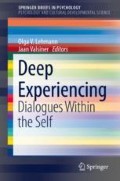Abstract
These conclusive remarks bring the chapters of the volume together into a theoretical exploration of the integration between cultural psychology and Dialogical Self Theory. Since the nature of cultural psychologies is mainly developmental, and the notion of I-position suggests a location in time, the text describes an attempt to put the I-position into movement, as a vector. This vectorial interpretation can lead to further explorations of the depth of experiences, in the vertical movements of felt intensities that sometimes transcend the capacity of language, calling in for silence-phenomena.
References
Albarghouthi, S. (2017). Facing serious illness: Affective pathways of communication. In O. V. Lehmann & J. Valsiner (Eds.), Deep experiencing. Dialogues within the self. New York: Springer.
Angelova, G. (2017). Opportunities: A frame for feeling into the future. In O. V. Lehmann & J. Valsiner (Eds.), Deep Experiencing. Dialogues within the self. New York: Springer.
Antinori, D. (2017). Dialogicality in dance: Mirror, mirror on the wall, … ? In O. V. Lehmann & J. Valsiner (Eds.), Deep Experiencing. Dialogues within the self. New York: Springer.
Aveling, E., Gillespie, A., & Cornish, F. (2014). A qualitative method for analysing multivoicedness. Qualitative Research, 1–18. https://doi.org/10.1177/1468794114557991.
Bachelard. (1958/2014). The poetics of space. London: Penguin.
Barros, S., Albert, I., & Ferring, D. (2017). Migrating identities: Affective dialogues across generations. In O. V. Lehmann & J. Valsiner (Eds.), Deep Experiencing. Dialogues within the self. New York: Springer.
Bakhtin, M. (1963/1999). Problems of Dostoevsky’s poetics. Mineapolis: Minnesota University Press.
Cage, J. (1961). In J. Cage (Ed.), Silence. Lectures and writings. Middletown: Wesleyan University Press.
Freeman, M. (2014). The priority of the other. Thinking and living beyond the self. New York: Oxford University Press.
Haunhorst, L. (2017). Globalization and identity: Affective mosaics of being. In O. V. Lehmann & J. Valsiner (Eds.), Deep Experiencing. Dialogues within the self. New York: Springer.
Hermans, H. J. (2001). The dialogical self: Toward a theory of personal and cultural positioning. Culture & Psychology, 7(3), 243–281.
Hermans, H. J., Kempen, H. J., & Van Loon, R. J. (1992). The dialogical self: Beyond individualism and rationalism. American Psychologist, 47(1), 23.
Hermans, H., & Gieser, T. (Eds.). (2012). Handbook of dialogical self theory. Cambridge, UK: Cambridge University Press.
Hermans, H. J. M., Konopka, A., Oosterwegel, A., et al. (2016). Fields of tension in a boundary-crossing world: Towards a democratic organization of the self. Integrative Psychological and Behavioral Science. https://doi.org/10.1007/s12124-016-9370-6.
Klempe, S. H. (in press). Implicit polyphony: A framework for understanding cultural complexity. Culture & Psychology, XXX–YYYY.
Lehmann, O. V. (Forthcoming). The cultural psychology of silence. Treasuring the poetics of affect at the Core of human existence. New York: Springer.
Lehmann, O. V., & Klempe, S. H. (2018). The musicality of poetry and poetic musicality: A case of cultural psychology approach to study the creativity within emotions and meaning. In O. V. Lehmann, N. Chaudhary, A. C. Bastos, & E. Abbey (Eds.), Poetry and imagined worlds: Creativity and everyday experience (pp. XXX–YYYY). London: Palgrave Macmillan.
Marsico, G., & Varzi, A. (2016). Psychological and social Borders: Regulating relationships. In J. Valsiner, G. Marsico, N. Chaudhary, T. Sato, & V. Dazzani (Eds.), Psychology as a science of human being: The Yokohama manifesto, Annals of theoretical psychology (Vol. 13, pp. 327–335). Geneva: Springer.
Munch, E. (1892). MM N 69. Literary sketch. The Scream. Translated by Francesca Nichols. Retrieved from http://www.emunch.no/TRANS_HYBRIDMM_N0069.xhtml#.WSVQemiGNPY (24.05.2017).
Sato, T., & Valsiner, J. (2010). Time in life and life in time: Between experiencing and accounting. Ritsumeikan Journal of Human. Sciences, 20(1), 79–92. Retrieved from http://www.psy.ritsumei.ac.jp/~satot/TEA/Time%20in%20Life%202010.pdf.
Saussure, F. (1916/1945). Curso de Lingüística General. Buenos Aires: Losada.
Suneja, S., Chaudary, N., & Sharma, B. (2015). Children as carers for their siblings in indian families: Using dialogical self theory to examine chidren’s narratives. International Journal for Dialogical Science, 9(1), 97–114.
Tangene, C. (2017). Feeling the silence of the ocean: Experiencing the night shift. In O. V. Lehmann & J. Valsiner (Eds.), Deep experiencing. Dialogues within the self. New York: Springer.
Valsiner, J. (1997). Constructing identity: A theoretical problem for social sciences. Paper Presented at the Workshop “Identitãtsdiskussionen in der Psychologie”, Martin-Luther-Universität. Halle-am-Saale, April 18, 1997.
Valsiner, J. (1998). The guided mind. A sociogenetic approach to personality. Boston: Harvard University Press.
Valsiner, J. (2000). Culture and human development. London: Sage.
Valsiner, J. (2002). Talking and acting: Making change and doing development. Narrative Inquiry, 12(1), 181–192. https://doi.org/10.1075/ni.12.1.25val.
Valsiner, J. (2007). Culture in minds and societies. New Delhi: Sage.
Valsiner, J. (2014a). Invitation to cultural psychology. London: Sage.
Valsiner, J. (2014b). The Raumaesthetik of Theodor Lipps as a Dialogical Research Programme. Invited Lecture at the 8th International Conference on Dialogical Self, Den Haag, August, 21, 2014.
Valsiner, J. (2016). The human psyche on the border of irreversible time: Forward-oriented semiosis. Paper presented at the 31st International Congress of Psychology, Yokohama, Japan.
Valsiner, J., & Cabell, K. (2012). Self-making through synthesis: Extending dialogical self theory. In H. Hermans & T. Gieser (Eds.), Handbook of dialogical self theory (pp. 82–97). New York: Cambridge University Press.
Vygotsky, L. (1934/1994). The problem of environment. In R. van der Veer & J. Valsiner (Eds.), The vygotsky reader (pp. 338–354). Oxford: Blackwell.
Zittoun, T. (2012). On the emergence of the subject. Integr Psych Behav, 46, 259–273. https://doi.org/10.1007/s12124-012-9203-1.
Acknowledgments
We kindly thank the participants of the Kitchen Seminar on May 17th 2017 in Aalborg’s Niels Bohr Centre for their ideas and input in the development of this manuscript.
Author information
Authors and Affiliations
Corresponding author
Editor information
Editors and Affiliations
Rights and permissions
Copyright information
© 2017 The Author(s)
About this chapter
Cite this chapter
Lehmann, O.V., Valsiner, J. (2017). Deep Feelings in Actions: Where Cultural Psychology Matters. In: Lehmann, O., Valsiner, J. (eds) Deep Experiencing. SpringerBriefs in Psychology(). Springer, Cham. https://doi.org/10.1007/978-3-319-68693-6_8
Download citation
DOI: https://doi.org/10.1007/978-3-319-68693-6_8
Published:
Publisher Name: Springer, Cham
Print ISBN: 978-3-319-68692-9
Online ISBN: 978-3-319-68693-6
eBook Packages: Behavioral Science and PsychologyBehavioral Science and Psychology (R0)

